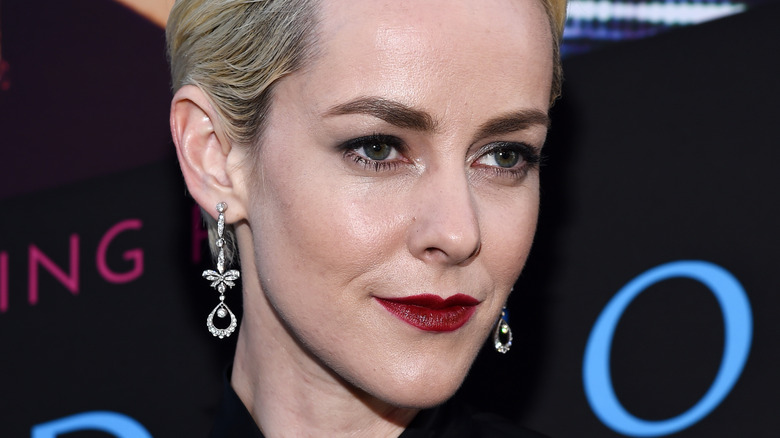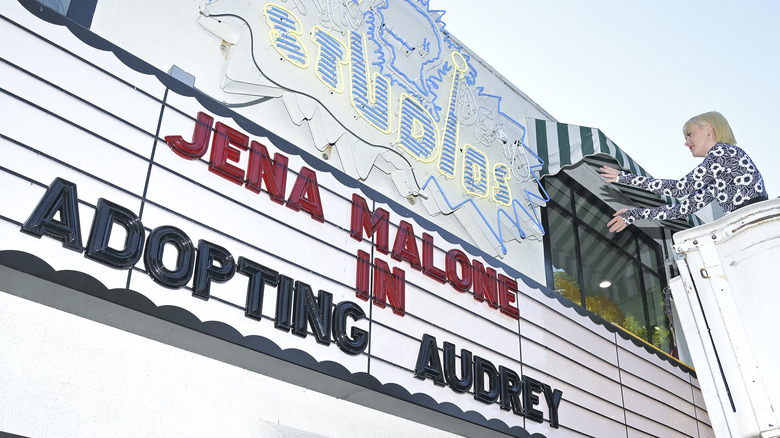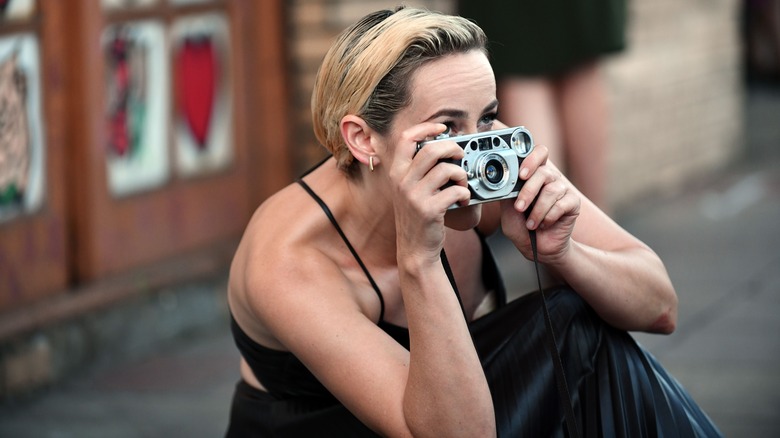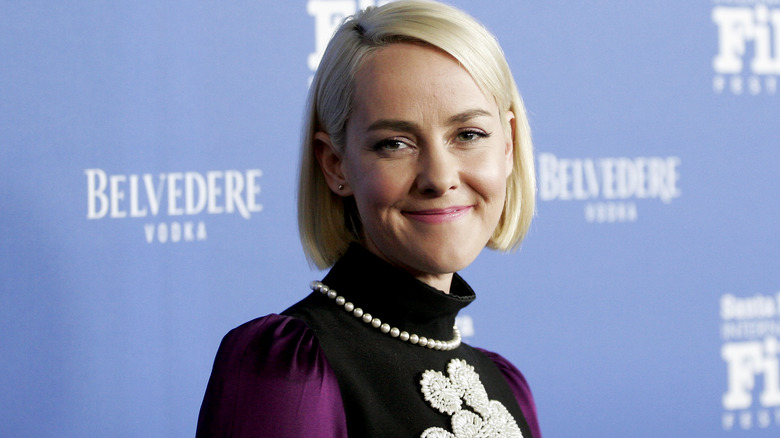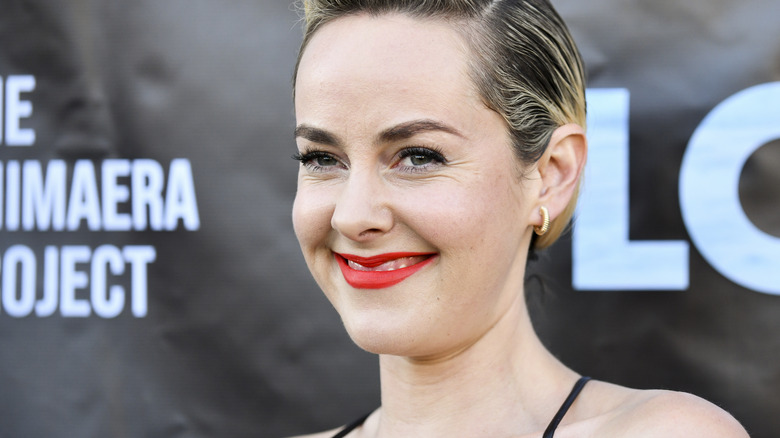Jena Malone Dishes On Her New Movie Adopting Audrey - Exclusive Interview
Jena Malone has been a familiar face in Hollywood since the '90s, starring as a young Jodie Foster in 1997's "Contact" and making herself known in 2001's "Donnie Darko" opposite Jake and Maggie Gyllenhaal. Other early highlights include playing Lydia Bennet in 2005's "Pride and Prejudice" and, of course, Malone's work as the fierce Johanna Mason in "The Hunger Games" series.
In recent years, Jena Malone has starred in blockbusters like "Antebellum," "Neon Demon," and "Inherent Vice," and she currently has several films in production and a few — hopefully — coming out soon. In her exclusive interview with The List, the actress teased her upcoming projects, including her new film "Adopting Audrey," which focuses on the phenomenon of adult adoption. For Malone, this process can mean the construction of new families and a reintroduction of community care into our cultural lexicon.
For her character, Audrey, found family becomes more important than ever as she struggles with losing her job and moving from place to place. During her interview, Jena Malone told us what she saw in the character that made her feel invested in the film's story and how the "Adopting Audrey" script struck a perfect balance between awkward and heartwarming.
Everything the actors needed was written into the script
I just watched the film, and the whole concept is so wild. I didn't even realize it was based on a true story. What was your research process like for getting to know the circumstances of adult adoption?
I actually didn't do much research because I was protective of having the character's experience, which is [that] she finds it through the rabbit hole of dissociative digital content viewing. I wanted her to discover it as she went, but then after, I've learned quite a bit about the adoption process in the technical, the legal, and then in a bigger word that we're all more familiar with — which is chosen family, which is like the heart's adoption, which is more about what this film is about. It's not about the technical aspects and stealing someone's inheritance or whatever, or all the things that can happen. Anything horrible can happen, I guess.
That's in the back of your mind throughout the film. It has such a unique pacing. It's quite slow, but there's a lot of tension. Did that feel like an adjustment for you in terms of how you played the character?
Yes. Tension is something you discover in the edit. You add tension, and you can build it that way. It's not an apparatus that an actor holds so much. You can discover tension in a scene, but then it sort of evaporates and then turns somewhere else. I don't know; I don't pay attention to tension in carrying a performance or articulating a performance.
Especially with some of the more awkward scenes, is the direction really playing into those scenes, or [is it] that it feels awkward to the character?
A lot of the awkwardness was built into the script. It was my job to embody a character that felt completely self-reliant and then completely self-isolated from the world, which creates tension and awkwardness. It was definitely things we were exploring in the filming of it.
Audrey's relationship with digital content feels familiar
What originally drew you to the story and to your character, Audrey?
I felt like she was a woman I hadn't seen on film but knew really well in real life. I have family members that resemble her, parts of myself that resemble her. She's sort of a byproduct of the death of grind culture and the emergence of that "DIY or die," where we feel this generation can do anything and everything but doesn't know how to find its purpose and its place.
I loved that the script was asking those questions in a very human way, where we can start having other conversations besides self-reliance, how that's not the whole conversation and that we need more community care. If society's not going to provide that for us, then we have to build apparatuses that help us receive the community care that we truly deserve. This film does that in a really unique way.
I'd love to hear more about that. Was that the way you felt going into it, or is that something that Audrey taught you through the script and through seeing those bonds being built?
I've been feeling that for a while, but that might be my own journey. I've been feeling that need for more community care emerging since we've entered and now are into and maybe exiting pandemic — we can't do it all on our own. Definitely, it feels resonant to myself. Also, I feel like it's even more part of the collective conversation than when we made the film in 2019.
I saw that it came out last year in some places. It's coming out this year here, but I didn't realize you filmed it back in 2019. It feels super current based on the protagonist always watching videos on her phone, dissociating a little bit. Did that feel true to you in terms of how the internet fills so much space for us emotionally and physically?
Yes. What's interesting is when you find something true for you, it's probably 100% true for others. We are all having such a similar experience on this planet, whether we like to admit it or not. That part of us that reaches for digital content to allow ourselves to zone in or zone out or disassociate or self-soothe is a real thing. Everyone has their unique appetite in that, which is what's been emerging.
It's a cool thing to talk about. It's not a dirty secret anymore. We have our addiction to digital media, and it serves a purpose because society hasn't given us other spaces to fulfill that.
Her character has spot-on survival instincts
Audrey also embodies such optimism. You see her going through so much throughout the course of the film, and then she just keeps going. Is that something that you've learned anything from, or did you see yourself in her as she sticks to it?
I'm a pretty optimistic person, but I felt like it was important for Audrey to not be jaded and to not be world-weary. When you live on the fringe of what society thinks is acceptable, it's easy to feel the weight and the burden of that. What's really rare and exceptional is when you can live on that fringe of, "I can live in my car. I can hold this job. I can move here. I can be nomadic and still have a purpose," and that it doesn't have to kill you — you can actually be like, "Maybe it's just not that meaningful to you." If it does look like a mess, maybe that's okay. I wanted her to be able to have that survival mechanism that's not heavy and burdened, but rather still optimistic and down for whatever life's going to throw at her.
That totally comes through. I feel like a lot of people appreciate that representation of a non-traditional way of living your life, moving around and following the things that bring you joy. I want to ask about how you built chemistry with the other actors, especially the actor who plays Otto. It's such a beautiful dynamic that you see unfolding throughout the film.
It was all written, and we didn't have much time to rehearse. It's really a blessing that Robert [Hunger-Bühler] was such an incredible actor and that we could come in and that we got along in that way. It was a big cinematic blessing.
Jena Malone won't give much away when it comes to her upcoming films
You have to do a lot of heavy power tool kinds of stunts. Did you have any experience with carpentry? Did any of that make you nervous?
No. I grew up with brothers who were constantly building things and had all that kind of stuff around, even though I'm not proficient at any of it. It doesn't make me feel deeply uncomfortable.
You have a couple of other projects coming up. Is there anything that you are particularly excited about that fans can look forward to?
I think this year, we're going to be able to see "Consecration," which is going to be an interesting film — something I hadn't done before — and "Swallowed," [in] which I got to collaborate with Carter Smith again. We did "The Ruins" together a long while ago. We'll see when we can see what Zack Snyder's up to. It probably won't be until next year, but I don't know.
That's all so exciting. Is there anything that you would want to tell people going into the theater to see "Adopting Audrey" that you think is important to hold onto when they watch the film?
No, I don't want to tell anyone anything ... It's such a unique experience when you get to watch your film and discover it for yourself, and I feel so protective of that. I never want anyone to tell me things or be like, "Oh, it's about this." I'm like, "No, don't do that. I'll get there. We can have that conversation after I see it."
Especially with the whole adult adoption angle, people are probably unfamiliar with that whole concept. There is a newer reality show about it — have you heard about "Adults Adopting Adults?"
I did, yeah. It came out during the pandemic, but then it was pulled because of some nefarious activities of one of the gentlemen. I don't know. I didn't ever get to see it.
"Adopting Audrey" is out in theaters now.
This interview was edited for clarity.
